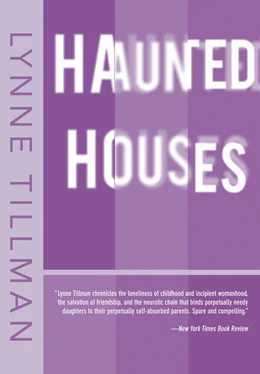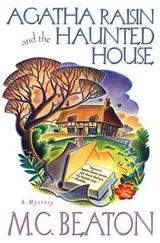Lynne Tillman - Haunted Houses
Здесь есть возможность читать онлайн «Lynne Tillman - Haunted Houses» весь текст электронной книги совершенно бесплатно (целиком полную версию без сокращений). В некоторых случаях можно слушать аудио, скачать через торрент в формате fb2 и присутствует краткое содержание. Год выпуска: 2011, Издательство: Red Lemonade, Жанр: Современная проза, на английском языке. Описание произведения, (предисловие) а так же отзывы посетителей доступны на портале библиотеки ЛибКат.
- Название:Haunted Houses
- Автор:
- Издательство:Red Lemonade
- Жанр:
- Год:2011
- ISBN:нет данных
- Рейтинг книги:5 / 5. Голосов: 1
-
Избранное:Добавить в избранное
- Отзывы:
-
Ваша оценка:
- 100
- 1
- 2
- 3
- 4
- 5
Haunted Houses: краткое содержание, описание и аннотация
Предлагаем к чтению аннотацию, описание, краткое содержание или предисловие (зависит от того, что написал сам автор книги «Haunted Houses»). Если вы не нашли необходимую информацию о книге — напишите в комментариях, мы постараемся отыскать её.
, Tillman wries of the past within the present, and of the inescapability of private memory and public history. A caustic account of how America makes and unmakes a young woman.
Haunted Houses — читать онлайн бесплатно полную книгу (весь текст) целиком
Ниже представлен текст книги, разбитый по страницам. Система сохранения места последней прочитанной страницы, позволяет с удобством читать онлайн бесплатно книгу «Haunted Houses», без необходимости каждый раз заново искать на чём Вы остановились. Поставьте закладку, и сможете в любой момент перейти на страницу, на которой закончили чтение.
Интервал:
Закладка:
This morbid daydreaming was of a kind to assuage the narcissism of the young girl who feels life inadequate and fears to face the realities of existence.
Christine decided that if Emily escaped less into dreams, into literature, and even history, she might have a more active and glamorous life. Christine had pored over the pages of Vogue well enough to know what was right and wrong with her own face. And she had fashioned herself, had even, since a child, planned her dreams so as not to be disappointed. I was always efficient, she thought. The water was boiling for tea and she thought about Emily and why Emily hadn’t called yesterday and it was almost noon and still no call today. She phoned her. Emily was asleep but said she wasn’t. She said she was only thinking. Emily didn’t like to be caught in the act. Christine pulled her robe to her, put an egg up to boil, opened a book. Merleau-Ponty: “Consciousness always exists in a situation.” It took a lot of effort not to think about Emily and what Emily might be thinking about her. They were so different from each other.
Christine threw aside bad thoughts and imagined herself in a neutral space where she was safe. Her long thin body needed a lot of space, a design of her own. She knew how to take care of herself. Her mother had insisted she learn all the womanly skills, had taught her them in fact with an urgency that Christine still felt. She would always be able to support herself, she told herself. If a man wouldn’t marry her. This last thought was not enunciated, it was a breath that was not breathed. She remembered watching Queen for a Day and, feeling embarrassed for the women, crying when the one she thought should win didn’t. Often they were married women with disabled husbands, otherwise they wouldn’t have been on the show. Emily still hadn’t called her back. Maybe she was angry at her about what she said about Keith. Emily didn’t know anything about men. On the other hand she said she didn’t care. Christine didn’t want to have another fight with Emily, after which she withdrew and Christine felt as rejected as she did now. The egg was too soft; she liked her eggs just right and didn’t time them. Christine stared at the book, then the phone. It might become animated through her need. She wished she could ask Emily if she thought there was a difference between need and desire, but maybe later. Christine threw down the philosophy book and picked up Memoirs of a Dutiful Daughter , which, at any point, could bring her to tears.
That was what was wrong; I needed Zaza.
Now Emily hated her paper, her poems. She could hear Edith outside the door, there was a sound in those movements that meant she might want company, but Emily couldn’t provide it. If she could rouse herself she’d go see a double feature, anything. Suddenly she jumped off the bed and resolutely moved to her typewriter, the one that her mother had given her when she was thirteen. You’re the one with talent, her mother had said, handing over the machine she had hoped to write her own novel on. Yet Emily had never been eager to show her mother what she came up with on that machine and Emily’s mother felt overlooked, slighted. Emily started writing a story in the first person. I am almost as angry with my girlfriend as I am with my boyfriend and I don’t know why. I don’t know why I like Keith when he doesn’t like me. She crossed that out. He doesn’t say he likes me but seems to like me. I want this story to be about independence and dependence. Keith and Christine will be the central characters and the story will revolve around their demands on me, Emily, and how Emily thinks she doesn’t need or want them, but somehow is completely entangled with them. Against my will, she wrote. She thought she’d have to disguise the characters completely so that Keith and Christine wouldn’t recognize themselves, but the story would be mangled if she did, and then what was the point. It seemed like another demand they were making of her.
Real conflicts arise when the girl grows older; as we have seen, she wished to establish her independence from her mother.
This was a story not a poem. Emily could use dialogue, direct argument between Christine and herself. But Emily wasn’t sure she knew what the argument was. Sometimes she thought that if Christine asked her for one more favor, she’d strangle her. Then she hated herself. Christine shouldn’t ask her so then she wouldn’t have to be put in that position. Anyway, she couldn’t say no. But there wasn’t a story, — there’s no plot in what’s not there. So much seemed not to be there, and yet normally she was very articulate, able to express herself with language, language her best ally when it wasn’t her worst enemy. Like now. What did Christine want from her or want in general. Who is Christine, she wrote, and felt disgusted. The unexpressed is stronger than the expressed, it must be, she thought. She looked up ineffable and wrote, My relationship with Christine skirts the ineffable. Except Emily didn’t wear skirts and why should she write about women who did? Could she use that figure of speech when it represented another kind of woman? Or, which woman was she writing about? Anyway, the thing didn’t have a plot, no drama, didn’t build or go anywhere. Emily comforted herself with the idea that plots were like skirts, you either did or you didn’t use things like that. Why do people want stories to go somewhere, she asked herself, and retired to bed.
In a well-regulated human heart friendship occupies an honorable position, but it has neither the mysterious splendor of love, nor the sacred dignity of filial devotion. And I never called this hierarchy into question.
Over Christine’s bed was an old photograph. It was torn from a book and much cherished by her. Two adolescent girls are in party dresses. They are playing blind man’s buff. One of the girls is standing at the side of the door, in the foreground. The other, blindfolded, is coming forward, one hand out in front of her, reaching, the other arm quiet at her side. She’s reaching and bent forward, as if misshapen by her ambition. She’s in a white dress that’s down to the floor, although the neckline is cut lower than one might expect for the period and her age. The other girl, the one who watches has drawn back her black dress, just slightly. There’s sunlight behind them. It’s a romantic image, poignant and eerie. The eerie quality is what made the photograph perfect. Christine wondered if everything romantic was eerie, unnerving, because of how it always ends. The girl who is blindfolded seems like she doesn’t know that, is innocent in white, while the girl in black, her hand cautiously holding her skirt, eyes wide open and looking, appears to know what the other doesn’t. The future is the foreground. When she made love to men below that picture, Christine held that irony inside her. Her efficiency did not extend to, in fact was circumvented by, her relations with men. Just what, she laughed to Emily, do they really want? Emily wanted a copy of the picture, but Christine didn’t want her to have it. It was enough that they borrowed each other’s clothes and books. I have to have some things for myself, Christine thought.
This time the dream Emily told no one was set in the American West. The girl who was and was not Emily — in it she says, adamantly, You’ve got me wrong, I’m not Emily — is wearing a bright red dress, very long, trailing on the floor behind her. The red dress is cut perfectly to her perfect body and one by one the men lift that long red dress and enter her. Her arms and legs are tied.
Woman is offered inducements to complicity.
Christine is driving me crazy, Emily thought after waking up with trouble from that dream. She always makes me feel I’ve done the wrong thing. I can never please her. She’s more beautiful. I can’t trust her. Yet she felt she had no reason not to trust her. These thoughts weren’t exactly thoughts. Emily didn’t want Christine to meet Keith. She decided they would fall in love and then she would have to stop speaking to both of them. She pictured the scene: walking in on them in flagrante. Christine jumps up and runs toward her, while Keith manages his embarrassment by lighting a cigarette almost casually. These kinds of thoughts were intrusions that Emily felt were willed by forces outside her. Hers and not hers. Just like the dirty dreams. The line between fantasy and reality can be walked like a tightrope, and often Emily could not read between the lines. It made reading Kafka effortless, things just as they are. She felt that both of them were realists because they didn’t have to distinguish between kinds of experience. Of course she recognized herself as a paranoid and it made her feel modern and better adjusted to whatever was to come. Her story about herself, Keith, and Christine continued: the two girls were looking at each other in the mirror, so that to the other there were two images to see, the real and the reverse image of the real. Each girl spoke to the mirror image, in reverse, and the person in front of that reflection. They had a normal conversation, but inside the person and beneath the image there was the reverse, mirrored by the mirror. The reverse was apparent to the other, and not the self. Emily thought that whatever she was thinking, Christine might be thinking too.
Читать дальшеИнтервал:
Закладка:
Похожие книги на «Haunted Houses»
Представляем Вашему вниманию похожие книги на «Haunted Houses» списком для выбора. Мы отобрали схожую по названию и смыслу литературу в надежде предоставить читателям больше вариантов отыскать новые, интересные, ещё непрочитанные произведения.
Обсуждение, отзывы о книге «Haunted Houses» и просто собственные мнения читателей. Оставьте ваши комментарии, напишите, что Вы думаете о произведении, его смысле или главных героях. Укажите что конкретно понравилось, а что нет, и почему Вы так считаете.












